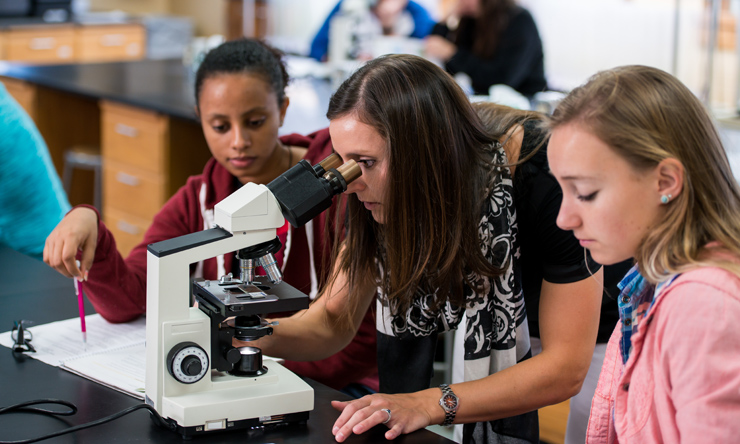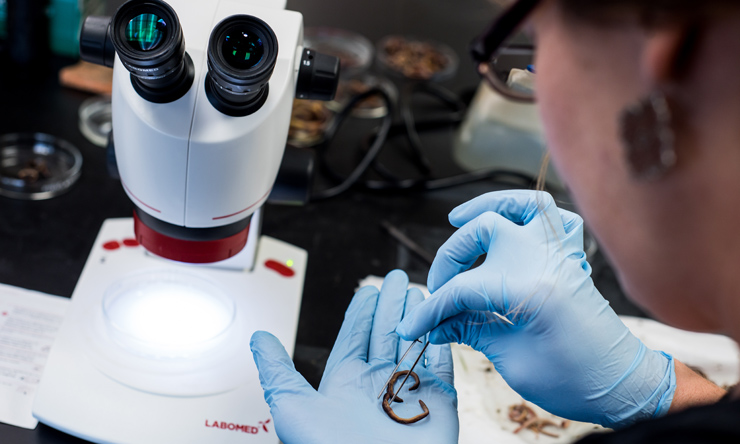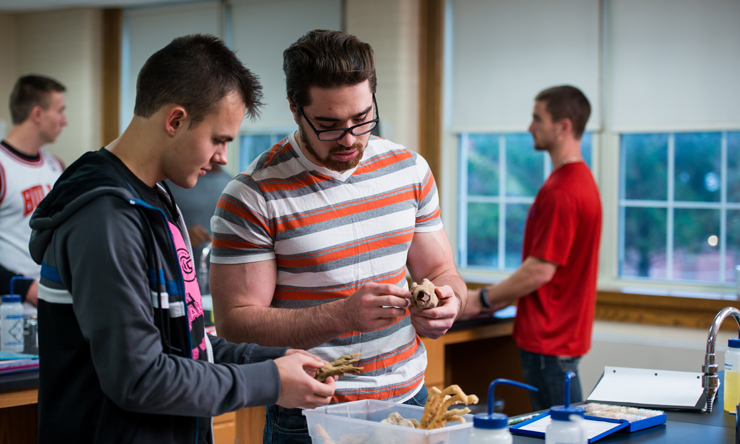Biomedical Laboratory Science
Use your scientific curiosity to contribute to the field of healthcare. A degree in Biomedical Laboratory Science prepares you to work in a hospital laboratory or lead groundbreaking research. Learn how to analyze and interpret medical tests that are key to diagnosing and treating disease.
A one-year, site-intensive clinical laboratory practicum will amplify your skillset and prepare you for a career focused on microbiology, virology, immunology, hematology, and more.
Ambrose Advantages
- Clinical Laboratory Practicum
- First-year Research Opportunities
- Study Anatomy and Physiology with Human Cadavers



At SAU, you'll get a state-of-the-art education full of unique opportunities, including research. Our biology-based programs are well-established, rigorous, and give you the skills to reach your highest potential. In fact, 90% of our biology program graduates enter a healthcare field. Expand your education with a second major and be guided by our faculty every step of the way.
Check Out the Biomedical Labratory Science Fact Sheet (pdf)
More Information about Biomedical Laboratory Science
More Information About Biomedical Laboratory Science
There are many ways to find an answer. Your education, based in the liberal arts, teaches you to be persistent and travel all roads before arriving at the solution. You'll receive a balanced education to mold you into a well-rounded laboratory scientist. You'll take classes in biology and chemistry, as well as genetics, organic chemistry, and biochemistry. You'll study cell structure and function, design and implement experiments to test your hypotheses, and cite and discuss chemical hygiene issues.
All of your classroom and laboratory preparation will culminate in a clinical laboratory practicum in your fourth year.
Our anatomy and physiology courses use cadaver dissection-based labs, making SAU one of the few universities in Iowa to offer this type of undergraduate experience. We've designed a strong curriculum and give you opportunities that support your goals; just ask our graduates, 90% of whom go into healthcare. Click here to read about some of our graduates and the success they've realized in the healthcare field.
In each laboratory course within the biology major, students design and implement their own experiments. You will analyze the data and present your findings in both written lab reports and oral PowerPoint presentations. These student-led, inquiry-based laboratory experiments help you gain valuable critical thinking and communication skills that can be applied to any profession.
Are your joining SAU as a first-year student? Consider enrolling in our Field Biology Research Learning Community - Inquiry in Action - which takes the lab to one of the few remaining urban wetlands near the Mississippi River, Nahant Marsh. The Integrated Statistics and New Student Seminar courses give you the support you need for generating strong experiments and presentations, and you get to present your research to the Ambrosian community at the end of the semester.
Deepen your learning by joining Biology Club or our Biology Honor Society, Beta Beta Beta. Become a member of Doctors to Bee, and be guided and supported by your peers as you prepare for graduate school. You can also work closely with faculty while participating in Biology Lab Prep Works.
You can also work alongside faculty in the lab on research projects - yours or theirs - through our Undergraduate Summer Research Institute. The College of Arts and Sciences also holds a spring Undergraduate Scholars Conference.
Coming in second only to nursing, Medical Laboratory Technologists are the most desired occupation in healthcare.1
Most medical laboratory scientists work in the hospital setting, where an estimated 98% of inpatients require at least one laboratory test. Graduates also would be prepared to work in diagnostic laboratories, physician offices, and outpatient care centers, which also have a need for laboratory testing.
The median salary for such a job is around $60,000 (2015). And, the demand for medical and clinical laboratory technologists is expected to be pretty high: nearly 20,000 people will be needed in that sector through 2026.2
1Eastern Iowa Community Colleges Health Sector Study
2Bureau of Labor Statistics
Dennis Tarasi, PhD, Chair and Assoc. Professor
Neil Aschliman, PhD, Professor
Amy Blair, PhD, Professor
Amanda Bohnert, MA, MS, Lecturer
Matt Halfhill, PhD, Professor
Kirk Kelley, PhD, Professor
Brenda Peters, PhD, Professor
Justin Rice, PhD, Asst. Professor
Nathan Steffens, Asst. Professor
Diamond Jelani, Biology Laboratory Coordinator
Degree Requirements
Your first three years at SAU will be coursework followed by a 12-15 month clinical laboratory practicum with an institution accredited by the National Accrediting Agency for Clinical Laboratory Sciences (NAACLS).
View courses and descriptions in the online course catalog
Requirements:
BIOL 199+Lab General Biology I: Foundation of Living Systems, 4 credits
BIOL 200+Lab General Biology II: Functioning of Living Systems, 4 credits
BIOL 201+Lab Diversity of Living Systems, 4 credits
BIOL 230+Lab Human Anatomy and Physiology I, 4 credits
BIOL 232+Lab Human Anatomy and Physiology II, 4 credits
BIOL 211+Lab Intro to Microbiology, 4 credits or 251+Lab Fundamentals of Microbiology, 4 credits
WI-BIOL 300 Biological Literature and Communication, 3 credits
BIOL 303+Lab Genetics, 4 credits
CHEM 105+Lab General Chemistry I, 4 credits
CHEM 106+Lab General Chemistry II, 4 credits
CHEM 110 Lab Safety, 1 credit
CHEM 207/209 Organic Chemistry+Lab I, 4 credits
CHEM 208/210 Organic Chemistry+Lab II, 4 credits
CHEM 319/320 Biochemistry+Lab, 4 credits
STAT 213 Applied Statistical Reasoning for the Sciences, 3 credits
Major Field Test, 0 credits
12-15 months clinical laboratory practicum
WI=writing intensive
This is a sample of courses to take and graduate within four years. This plan assumes the student has taken three years of foreign language in high school.
Check the online course catalog for course prerequisites.
Year One
| FALL | Credits | SPRING | Credits |
|---|---|---|---|
| BIOL 199+Lab | 4 | BIOL 200+Lab | 4 |
| CHEM 105 | 4 | CHEM 106+Lab | 4 |
| MATH171 | 3 | THEO 100-level | 3 |
| ENGL 101 | 3 | Oral Communication | 3 |
| New Student Seminar | 1 | InfoLit | 1 |
| KIN 149 | 1 | CHEM 110 | 1 |
| Total | 16 | Total | 16 |
Year Two
| FALL | Credits | SPRING | Credits |
|---|---|---|---|
| BIOL 201 | 4 | BIOL 211+Lab or BIOL 251+Lab | 4 |
| CHEM 207 | 3 | CHEM 208 | 3 |
| CHEM 209 | 1 | CHEM 210 | 1 |
| STAT 213 | 3 | Social Science | 3 |
| PHIL 100-level | 3 | Humanities | 3 |
| KIN activity | 1-2 | Creative Arts | 3 |
| Total | 15-16 | Total; | 17 |
Year Three
| FALL | Credits | SPRING | Credits |
|---|---|---|---|
| BIOL 300 | 3 | BIOL 303+Lab | 4 |
| BIOL 230+Lab | 4 | BIOL 232+Lab | 4 |
| CHEM 319 | 3 | THEO/PHIL 300-level | 3 |
| CHEM 320 | 1 | WI-Humanities | 3 |
| PHIL/THEO | 3 | Medical Terminology | 1 |
| Total | 14 | Total | 15 |
Summer
Clinical Laboratory Practicum, 8 credits
Year Four
Fall – Clinical Laboratory Practicum, 16 credits
Spring – Clinical Laboratory Practicum, 16 credits
Contact
Brenda J. Peters, Ph.D.
Biology Department
207 Lewis Hall
518 W. Locust St.
Davenport, IA, 52803
563-333-6417
PetersBrendaJ@sau.edu
